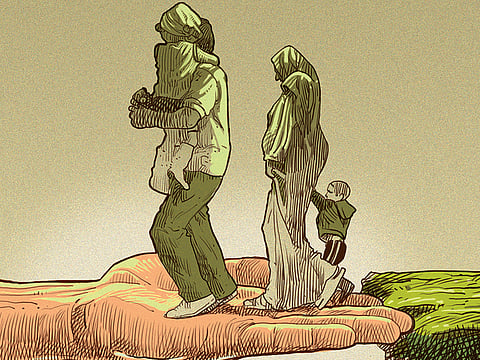To end refugee crisis, we need more than grief
It is emotional voyeurism when we fail to care beyond being sad for the victims of the tragedies that governments helped create and which we all ignored

We are increasingly reliant on searing images as our collective wake-up calls to problems we have long known existed but about which we have done little — and, on the other side of those images, is brokenness and personal grief. The loud calls to action and demands of accountability are music to the ears of everyone who has ever wondered how we can get the world to care. But why must we wait for grief to make us brave?
Many in America and Europe are now publicly mourning for the Kurdi family, one example of lives senselessly lost amid an extreme tragedy and our moral failing to prevent it. The searing pictures of Aylan Kurdi dead on a beach set off a belated call to action for the humanitarian crises impacting millions displaced by wars across the Middle East and the Horn of Africa, long after the first people died trying to reach Europe’s shores. Human rights groups estimate more than 12,000 children have died in the Syrian civil war and millions have been displaced.
It has been more than three years since human rights groups confirmed the Syrian government’s use of cluster bombs in an attack that killed children, but it was the image of one dead child on what his parents had hoped would be the shores to offer them safety that reminded even migration-averse politicians and their constituents of a forgotten war and the longstanding refugee crisis they had all but quietly ignored.
For Abdullah Kurdi, life will never be the same. “I don’t want anything else from this world,” he told reporters. “Everything I was dreaming of is gone. I want to bury my children and sit beside them until I die.”
Those closest to the centre of tragedies like these are never again the same; when their losses become ours, when we finally find ourselves feeling empathy for a few iconic, tragic figures instead of apathy towards a broken system or intractable problem, we want to not be the same.
Even as our former apathy implicates us in the tragedy, we hope that our grief will allow us to be a part of the solution. But our broken world is messy, solutions are complicated and we have to build the resolve to demand responses beyond empathy and sustain people’s focus on hard solutions to drive meaningful, lasting change. Usually, however, the calls to action fade to numbness until we are shocked by the next tragedy.
To truly break this cycle, our desire to push for the world we want must outlive news cycles; it must outlive our empathy for individual moments of pain. Those at the centre of private tragedy turned public call-to-conscience never forget. Years after Virginia state senator Creigh Deeds survived an attack by his son, who suffered from mental illness and later died of a self-inflicted gunshot wound, Deeds is working to reshape US’ broken mental health care system, but has told supporters, “I’m not complete.”
No simple answers
Andy Parker, the father of slain tele-vision journalist Alison Parker, recently wrote in the Washington Post he would dedicate his life’s work to ending gun violence. “We have to ask ourselves: What do we need to do to stop this insanity?”
Suddenly it seems as if the entire world is asking in chorus, “What do we need to do to stop this insanity?” But the answers are hardly as simply as the questions. We must drastically reform how governments and institutions treat those brave enough to flee from war and conflict — whether Syria, Yemen, South Sudan, Central African Republic, Tunisia, Somalia or anywhere else. To continue to under-fund, undermine and ignore humanitarian fallout from Britain’s military actions and foreign policy failings is moral malpractice. To do so because of xenophobia and Islamophobia is an even greater sin. The stakes have always been clear, but this time grief broke open the truth for all to finally see: This is what United Nations High Commissioner for Refugees Antonio Guterres calls “the biggest refugee population from a single conflict in a generation”.
Public grief can be an opportunity for growth, to both become the type of people we want to be and to demand the policy changes we know that everyone deserves. But ultimately, public grief is just emotional voyeurism when we fail to care beyond being sad for the victims of the tragedies that our governments helped create and which we continually ignored.
I believe in my heart this time will be different. I believe Aylan broke us open in a way, and that we will never feel whole again. There is no need to wait for more pain to understand there is hope for all of us still living to help one another get free. But we won’t know until we see who shows up for the work that will carry us through the other side of the grief.
— Guardian News & Media Ltd
Sabrina Hersi Issa is a technologist and human rights advocate.



